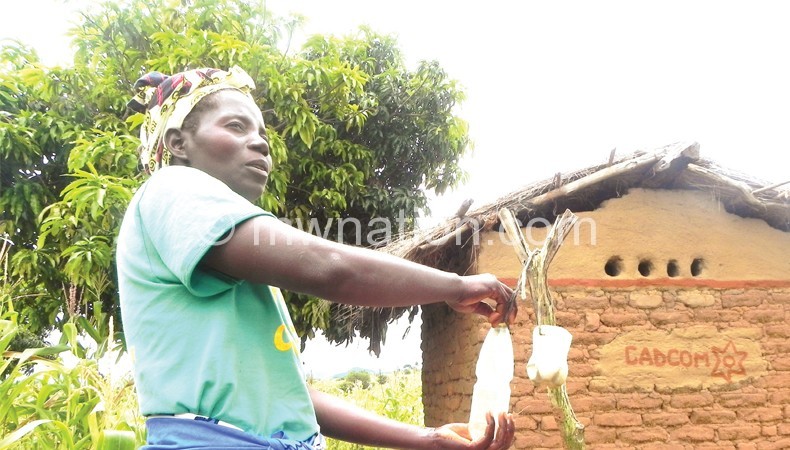Mtwalo families on the rise

An elevated house of goats is standing in front of two grass-thatched huts. The small one is a kitchen with wall art which embodies an in-built wood-serving stove made of clay, sand, manure, banana stems, paper and glass—reportedly a rendition of a conservatory measure the host saw during a cultural exchange trip to Maduwawa Village in Balaka recently.
The bigger is home to Eliza Mkandawire, a 42-year-old widow with five children. There is no garbage in the homestead and its vicinity. Throughout the visit, the woman is smiling and her family looks healthy; no longer victims of diarrhoea diseases that used to frequent them before she established a cement-slab pit latrine and a “rule of life” to wash hands after using the toilet.
“Welcome visitors,” the mural beckons onlookers to the household which has become a face of a community empowerment programme being championed by the Catholic Commission for Development (Cadecom) in Chilombo-Zgambo Village in Mzimba North. Since September 2010, the locals have become accustomed to calling the village-transformation initiative ICD, an acronym for Integrated Community Development.
When nature calls, the woman is never shy to usher visitors to the modest toilet with a dripping bottle of water suspended on a pole at its entrance. It is not the pit latrine one is accustomed to seeing in rural settings. However, it is up to the rising standards of the village which has made sanitation part of its development agenda: No dirt. Very clean. A shining example, so locals call it.
Looking back, Group Village Head Chilombo-Zgambo says: “Mine was a bad village. No toilet. No rubbish pit. We lost seven people to cholera in a year or two.”
That was five years ago, says Mkandawire, adding: “For the past three years, some of us who had no toilet have built our own, which has brought back the freedom and respect we were sacrificing by relieving ourselves in the nearby fields.
“We thank Cadecom for mobilising us into clubs and training us in moulding cement slabs. They also told us the advantages of having a hygienic toilet. Washing hands after toilet use has become a rule of life and my children and I no longer struggle with waterborne diseases that thrive on poor sanitation.”
Throughout the conversation, the 15-strong club, christened Umoza, was the reference point of the makeover happening in her home and backyard. At one point, she rushed to attend to a boiling pot of green maize on the fire which consumes less firewood than open fires.
“It does not only save our forests, but also time. It saves the heat and directs all of it on what you are cooking,” she says on her return.
Looking beyond the house, one sees a livestock home hanging about one meter from the ground. It is the creation of her hands. Two years ago, the woman and nine other club members received two goats each. Now she has four goats and will be required to pass on two of them to one of the five group members who did not benefit from the first lot.
“My life has already changed. I never had hope of owning a goat, now I have two. Apart from the fact that I can kill one for sale or for food, I use the droppings for manure for my maize and vegetable gardens. I no longer buy chemical fertiliser which is costly,” said the woman whose farmstead borders a healthy crop of maize.
This year, her group was voted the best club of the six in Chilombo and its neighbourhood—Tifwase, Umoza, Tiyezge, Kaliyako, Ukhondo and Chilinda—and she was awarded a mattress in recognition of her outstanding performance.
According to Cadecom project officer Lillian Gondwe, the programme aims to improve livelihoods of 525 households in poverty in Mtwalo area, but only 325 have been reached so far.
“Among other things, we want to facilitate community-based sanitation both at home and water points. We train the clubs in slab casting,” says Gondwe of the initiative which has led to the drilling of 10 boreholes and rehabilitation of eight.
The initiative has also empowered the pastoral community to embrace farm diversification, make farming serious business and improve the way they do various business, explains Gondwe
Mkandawire sells maize, bananas, papaws and groundnuts. Thanks to the proceeds of the farm produce business, which has been flourishing ever since she started saving time by cutting back on diseases related to poor hygiene as well as the hours formerly wasted on cooking on open fires—she is able to pay fees for two of her children who nearly dropped out of Elunyini Community Day Secondary School because she could not afford K5 000 in school fees a year ago.
One of her daughters completed secondary education last year.
“As my dreams are coming true one at a time, I have set my sights on getting chickens and pigs which do not only multiply faster than goats, but produce more manure,” she says.





